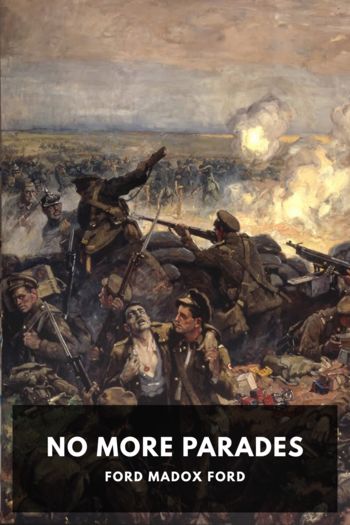Some Do Not … by Ford Madox Ford (story read aloud txt) 📕

- Author: Ford Madox Ford
Book online «Some Do Not … by Ford Madox Ford (story read aloud txt) 📕». Author Ford Madox Ford
Tietjens sat, huddled rather together, dejectedly, the firelight playing on the silver places of his hair. It had grown nearly dark outside: they had a sense of the large room that, almost week by week, had grown, for its gleams of gilding and hand-polished dark woods, more like the great dining-room at the Duchemins. He got down from the fire-seat with a weary movement, as if the fire-seat had been very high. He said, with a little bitterness, but as if with more fatigue:
“Well, I’ve got the business of telling Macmaster that I’m leaving the office. That, too, won’t be an agreeable affair! Not that what poor Vinnie thinks matters.” He added: “It’s queer, dear …” In the tumult of her emotions she was almost certain that he had said “dear.” … “Not three hours ago my wife used to me almost the exact words you have just used. Almost the exact words. She talked of her inability to sleep at night for thinking of immense spaces full of pain that was worse at night. … And she, too, said that she could not respect me. …”
She sprang up.
“Oh,” she said, “she didn’t mean it. I didn’t mean it. Almost every man who is a man must do as you are doing. But don’t you see it’s a desperate attempt to get you to stay: an attempt on moral lines? How can we leave any stone unturned that could keep us from losing our men?” She added, and it was another stone that she didn’t leave unturned: “Besides, how can you reconcile it with your sense of duty, even from your point of view? You’re more useful—you know you’re more useful to your country here than …”
He stood over her, stooping a little, somehow suggesting great gentleness and concern.
“I can’t reconcile it with my conscience,” he said. “In this affair there is nothing that any man can reconcile with his conscience. I don’t mean that we oughtn’t to be in this affair and on the side we’re on. We ought. But I’ll put to you things I have put to no other soul.”
The simplicity of his revelation seemed to her to put to shame any of the glibnesses she had heard. It appeared to her as if a child were speaking. He described the disillusionment it had cost him personally as soon as this country had come into the war. He even described the sunlit heather landscape of the north, where naively he had made his tranquil resolution to join the French Foreign Legion as a common soldier and his conviction that that would give him, as he called it, clean bones again.
That, he said, had been straightforward. Now there was nothing straightforward: for him or for any man. One could have fought with a clean heart for a civilisation: if you like for the eighteenth century against the twentieth, since that was what fighting for France against the enemy countries meant. But our coming in had changed the aspect at once. It was one part of the twentieth century using the eighteenth as a catspaw to bash the other half of the twentieth. It was true there was nothing else for it. And as long as we did it in a decent spirit it was just bearable. One could keep at one’s job—which was faking statistics against the other fellow—until you were sick and tired of faking and your brain reeled. And then some!
It was probably impolitic to fake—to overstate!—a case against enemy nations. The chickens would come home to roost in one way or another, probably. Perhaps they wouldn’t. That was a matter for one’s superiors. Obviously! And the first gang had been simple, honest fellows. Stupid, but relatively disinterested. But now! … What was one to do? … He went on, almost mumbling. …
She had suddenly a clear view of him as a man extraordinarily clear-sighted in the affairs of others, in great affairs, but in his own so simple as to be almost a baby. And gentle! And extraordinarily unselfish. He didn’t betray one thought of self-interest … not one!
He was saying:
“But now! … with this crowd of boodlers! … Supposing one’s asked to manipulate the figures of millions of pairs of boots in order to force someone else to send some miserable general and his troops to, say, Salonika—when they and you and common sense and everyone and everything else, know it’s disastrous? … And from that to monkeying with our own forces. … Starving particular units for political …” He was talking to himself, not to her. And indeed he said:
“I can’t, you see, talk really before you. For all I know your sympathies, perhaps your activities, are with the enemy nations.”
She said passionately:
“They’re not! They’re not! How dare you say such a thing?”
He answered:
“It doesn’t matter … No! I’m sure you’re not … But, anyhow, these things are official. One can’t, if one’s scrupulous, even talk about them … And then … You see it means such infinite deaths of men, such an infinite prolongation … all this interference for side-ends! … I seem to see these fellows with clouds of blood over their heads. … And then … I’m to carry out their orders because they’re my superiors. … But helping them means unnumbered deaths. …”
He looked at her with a faint, almost humorous smile:
“You see!” he said, “we’re perhaps not so very far apart! You mustn’t think you’re the only one that sees all the deaths and all the sufferings. All, you see: I, too, am a conscientious objector. My conscience won’t let me continue any longer with these fellows. …”
She said:
“But isn’t there any other …”
He interrupted:
“No! There’s no other course. One is either a body or a brain in these affairs. I suppose I’m more brain than body. I suppose so. Perhaps I’m not. But my conscience won’t let me use my brain in this service. So I’ve a great, hulking body! I’ll admit I’m probably not much good. But I’ve nothing to live for: what I stand for isn’t any more in this world. What I want, as you know, I





Comments (0)